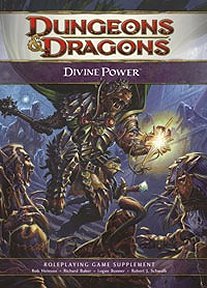
This book is aimed at the players of characters who look to the deities of their world for inspiration or power, and presents new ideas and options for any paladin, cleric, avenger or invoker character. The main part of the book consists of chapters for each class mentioned, giving new class features, builds, powers and paragon paths for each. The final chapter looks at divine domains with new feats, epic destinies and rituals available, and at deities in general.
First up, the avenger. Introduced in Player's Handbook 2 he is an agent of divine justice with a mission to smite the enemies of his deity wherever they arise. There's a new type who specialises in bringing his targets to justice through power of numbers, gaining strength from his allies. Lots of new 'prayers' of course, and some interesting sidebars about underlying motivation. One suggests options for why a character might have become an avenger, and how his fellow-religionists might view him; another - more aimed at DMs than players - suggests ways of using avengers as a potent force in your campaign, allies or adversaries depending on your needs. The suggestion that an avenger might serve more than one deity, perhaps persuing an idea - e.g. opposition to slavery - rather than the ends of a single god is made, and there's a list of likely targets that followers of the (good) deities in the core rulebooks might hunt. The paragon paths present a diverse range of approaches, and even before you reach that level you could benefit by deciding which one appeals and playing your character that way.
Chapter 2 deals with the classic god-botherer, the cleric. It presents a new build, the shielding cleric, who acts as protector to the party in combat, as well as choices which lead to greater healing abilities. One interesting paragon path option in this combat-oriented game is the Messenger of Peace, who seeks to find more civilised ways of resolving differences than a brawl - but with a note that this only applies to sentient opponents, not much use preaching peace to a monster who is merely looking for its lunch!
Next comes the invoker. Carving an agreement with a god and wielding his power, there are new powers in profusion here along with some ideas for role-playing an invoker... did he enter into his agreement willingly, for example, and what do the words his deity puts into his mouth sound like? Or you can take the paragon path Adept of Whispers and speak rarely if at all. (The suggestion is that you still talk at the game table, though... probably wise, I once lost my voice totally on game night and all notes had to go round the whole table to satisfy that suspicious bunch!) Other paragon paths include the Devoted Orator, whose preaching echoes his deity's voice, and the Speaker of the Word, who knows some dread word of power granted by his god...
Then it is the turn of the paladin. The chapter is headed by a quote from a Tennyson poem that I've been using for paladins since 1980! Paragon paths include the classic roles of Demonslayer and Dragonslayer, as well as the Holy Conqueror who is an all-out brawler determined to further the ends of his god whatever the odds, and the Questing Knight, whose quest is fertile ground for the imaginative DM to weave through the campaign.
The final chapter is called Divine Options. It concentrates on providing a wealth of options to allow characters to be customised in accord with their chosen deity's focus and outlook but in a myriad of ways depending on individual preference. Mechanically, this is handled by a vast array of feats based on divine domains, character class and more; but of more interest to the role-player is the section that discusses how your choice of deity will influence how your character thinks and acts. Unlike the Player's Handbook, evil domains and their associated feats are given here, primarily for the use of DMs building antagonist characters, although they could prove interesting in the hands of players prepared to tread those paths. The overwhelming assumption is that player-characters will be 'good' or at least neutral in view, however. Another interesting section is that on backgrounds, a collection of reasons you can pick and adapt to explain why your character is who he is and does what he does.
This book provides an excellent range of options for anyone playing an avenger, cleric, invoker or paladin. While tied to the core patheon presented in the core rulebooks, it will be fairly straightforward to transfer ideas to deities of your own devising. Best, though, are the notes scattered throughout on how to make that character come alive in the service of his chosen god, aiding the player in thinking about his character as a coherent whole, an individual dedicated to his cause rather than a collection of powers and feats.
Return to Divine Power page.
Reviewed: 11 May 2010

